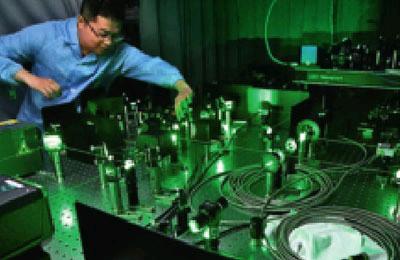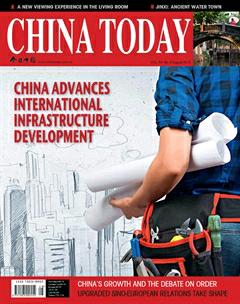Sci-Tech

Quantum Computing Lab Opens in Shanghai
A laboratory to develop quantum computers that can process data billions of times faster than current digital computers opened in Shanghai recently. Co-founded by the Chinese Academy of Sciences (CAS) and Chinas Internet giant Alibaba, the lab is expected to produce a general-purpose quantum computer prototype with 50-100 quantum bits by 2030. It will be applied to solving significant practical problems such as big data processing. “Research on quantum computing can be compared to that on atomic and hydrogen bombs and man-made satellites during the era of peace,” said Pan Jianwei, executive vice president of the University of Science and Technology of China and the lab director. He explained that Shanghai had been choosen for the labs location due to the expected high demand for quantum computing from the citys financial sector. The lab will combine Alibabas strengths in classical calculation algorithms, structure, and cloud computing and CAS prowess in quantum computing
and quantum artificial
intelligence.
China Becomes Worlds Largest Robot Market for Second Consecutive Year
China became the worlds largest consumer market for robots for the second consecutive year, according to recently released China Robot Industry Alliance (CRIA) statistics. Sales of robots in China increased by 54.6 percent in 2014 to around 57,000 units, accounting for 25 percent of the global total. Nearly 17,000 units were made in China with a value approaching RMB 3 billion, or an increase of 60 percent from 2013. CRIA predict that the total number of robots used in Chinas manufacturing industry in 2015 will keep growing rapidly. Under the national plan “Made in China 2025,” designed to make China a world manufacturing power, the robot industry has become one of the hottest. Industrial robots have been applied in automaking, electronic and food industries in the country, aside from the military, aviation, medical equipment as well as metal work fields. Analysts say, with real needs for automatic dependency in many areas, rising labor costs and undesirable work environments in certain industries, the potential market for robots in China will expand. Besides, due to demographic factors, service robots will be more in demand, especially in healthcare.
Chinas Supercomputer to Support Worlds Largest Radio Telescopeendprint
Supercomputer Skyeye-1, capable of a quadrillion computing operations per second, will support space exploration by connecting to the worlds largest radio telescope based in Southwest Chinas Guizhou Province. Assembly of the telescope, with a dish the size of 30 football fields and located deep in the mountains of Guizhou, is underway, according to Dawning Information Industry Co., Ltd., which is participating in its construction. When it is completed in 2016, the 500-meter aperture spherical telescope (FAST) will be the worlds largest. A radio signal as far as tens of billions of light years away could possibly be caught by the telescope, which will extend Chinas space tracking scope from the moons orbit to the outside edge of the solar system upon its completion next year. As FAST needs a strong computing system for massive data storage and processing, the Institute of Computing Technology under the Chinese Academy of Sciences (CASICT), Dawning Information Industry Co., Ltd., and China (Guizhou) Skyeye Group have signed an agreement to jointly build the Qiannan Super Computing Center in Guizhou. FAST daily peak demand will be above 200 teraflops per second and its first-phase storage demand more than 10 petabytes, said Zhang Peiheng, director of the High Performance Computer Research Center, CASICT.
Worlds First Double-fuel Ro-Ro Made in China
Work on the worlds first large roll-on/roll-off ship (roro) powered by two kinds of fuels began on August 5 in the south Chinese city of Nantong. The ship, which can carry 3,800 cars, is the first ro-ro powered by liquefied natural gas (LNG) and manufactured by Nantong COSCO KHI Ship Engineering Co., Ltd. (NACKS), a joint venture between China Ocean Shipping (Group) Company, aka COSCO, and Japans Kawasaki Heavy Industries Ltd. The carrier will run on LNG on voyages through the Baltic and North seas, a navigation zone under strict European environmental requirements. It can also be powered by conventional fuel in other areas. Designed independently by NACKS, the 181-meter-long ship has an icestrengthening double hull and a design speed of 18.6 knots. The 10-deck ship can load cars, trucks, and hazardous materials. Compared with conventional carriers, the ship consumes less fuel and emits less carbon dioxide. The release of sulfide and particulate matters is negligible.endprint
- CHINA TODAY的其它文章
- Initiating a New Partnership Between China and Developed Countries
- China and Advanced Economies–A Win-Win Relationship
- Fangshan’s Wineries and Ecological Practices
- Sustainable Development Mode on the“Roof of the World”
- “We Must Grasp the Opportunity that Paris Offers”
- Face History and Maintain Peace

